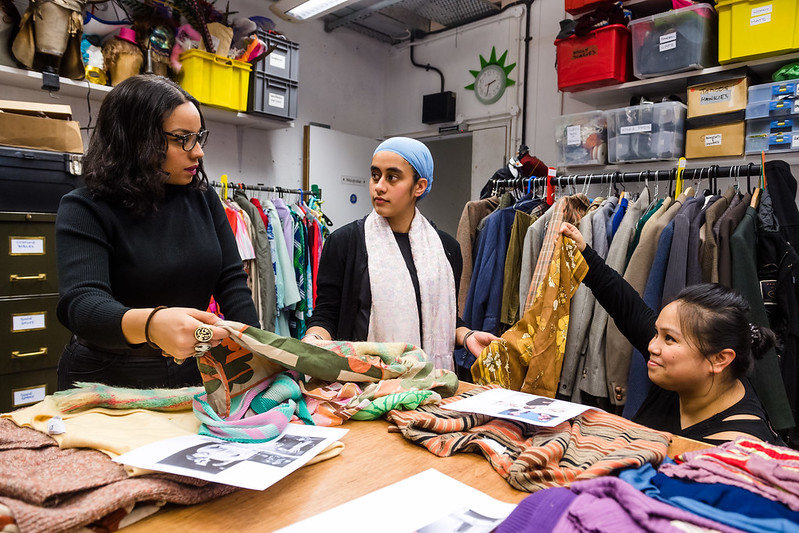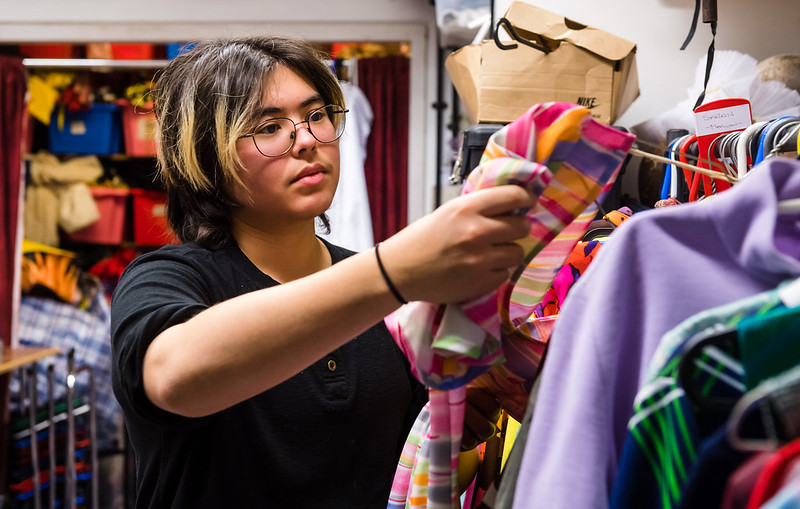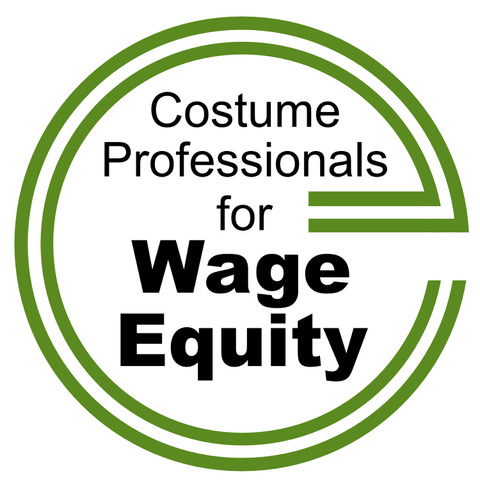
06 Oct The True Costs Of Unpaid Internships
I recently had a serious sit-down with an intern at a theatre where I was working as a Designer. I wanted to explain why they had been unilaterally shot down by the production team when volunteering to stay late during tech. The pushback was not because we didn’t value their personal labor, but because we had a higher commitment to the company’s mission to only offer legal, ethical internships.

We were being strict about our treatment of the interns because we wanted them to walk away with both an education and a strong sense of how they should be treated. Even if we really, really needed the labor.
Sadly, company policies like this are far too often either not common or are not enforced. Summer theatre internship programs in particular are notorious for taking advantage of students and early-career professionals who will work themselves to exhaustion for free.
These young, ambitious workers are groomed to believe that their passion for theatre is in direct correlation to how much they are willing to do for as little money as possible.
It is a practice made even more disturbing by the fact that internships are increasingly required on the academic side in order to complete a college degree. Some universities even require that students pay course fees to gain these additional credits.
This translates to a system where already cash-strapped students with unprecedented tuition loan debt are now required to pay for the privilege of providing uncompensated labor.
All too often, a stylist or a designer will put out a call for an unpaid intern on a professional job board. The outdated practice of acquiring an unpaid assistant is something that Producers not only encourage, but count on when planning their budgets. These job postings and their creators perpetuate the antiquated claims that the only way to “break into” this elite career is by working for free and “paying your dues.”
On-the-job training and working one’s way up is incredibly valuable to the emerging professional and the company that fosters their growth. However, starting at the bottom should not require years of poverty, or be limited to only those with the financial privilege to gain entry. These kinds of internships are not only exploitative, they are illegal.
What Does a Legal Internship Look Like?
The US Department of Labor is very specific about what constitutes an intern vs. an actual employee. The most basic way to break it down is to use the Primary Beneficiary Test: who benefits the most from the working relationship?
To summarize: Interns are there to learn and organizations may not depend on their labor in order to keep their businesses running. If an intern does not receive school credit, they must be paid. If an intern is paid, they MUST be paid AT LEAST minimum wage. Some states have more stringent requirements which take precedence over Federal law.
There are exemptions to the Fair Labor Standards Act for not-for-profits if an intern (not the employer) volunteers to forgo compensation. However, even volunteer labor is federally mandated not to replace an otherwise paid position.
Furthermore, interns and volunteers may not take part in the BUSINESS operations (such as running the box office) of a not-for-profit. The distinction between the non-profit work and business operations of a theatre can get muddy, but in general if you’re handling money, selling tangible products, or communicating with other businesses on the theatre’s behalf (especially across state lines), you may be classified as an employee and entitled to wages.
Ultimately it’s up to the interpretation of your state Department of Labor which, sadly, has very little idea of what we do and how the law may apply to our specific job duties. If you’re in the mood to educate as much as you learn, I encourage you to call them and ask questions. It’s high time they heard from us.
My Internship is legal. Is it Ethical?
Plenty of things that are legal are also unethical, or at the very least jerk moves. While theatres in general are not unethical entities (far from it!), some engage in practices that are at odds with their stated goals of inclusivity.
Unpaid internships contribute to a theatre landscape in which only students of privilege can afford the learning opportunities being offered.
This country has a disturbingly homogeneous theatre landscape. I believe that this is a result of economic gate keeping and employment practices that drive away talented people who do not have the luxury of financial security.
We must look at how many opportunities these internships are truly providing. If a theatre has to rely on unpaid labor to survive, it is doubtful that an intern will move on to gainful employment in that company. Where is the opportunity there?
Interns who are treated as employees are often not given the proper training required to be successful in the field. When a student or early career professional is doing a job they are untrained for on a tight deadline, injury and unsafe work practices are the result. These practices will follow the former-intern to every subsequent theatre that employs them until they are either corrected or catastrophic failure occurs.

Given the social, economic and professional repercussions of intern culture, how can anyone who believes in equal opportunity support such a system?
An ethical internship is an internship that teaches and mirrors the practices of an ethical (and successful) workplace. A full-time intern must be paid full-time wages. If no wages or only part-time wages are available, the time commitment and expectations of the program should mirror the compensation offered. Internships taken for college credit should not exceed the hours expected for a standard college course, nor should an internship for credit include fees outside of what a course with similar educational outcomes would incur. No one should have to take out a loan in order to “afford” an internship.
An ethical internship focuses on professional development first and foremost. The intern should have a dedicated mentor and a workload that allows them time to gain proficiency in their field. Interns need time to learn and explore. They should be encouraged to engage in a healthy work-life balance – a practice to be modeled by those who mentor them. Interns deserve to feel safe. Theatres must respect and value interns as colleagues and potential peers.
How do we create more ethical training programs?
Many theatres need more labor than they can afford. Offering internships has become the norm because companies and production managers are consistently offering technically-demanding seasons without the financial backing necessary to take on ambitious productions.
Many colleges need more training opportunities than they can offer. Encouraging internships has become the norm because college theatre departments are downsizing and their ability to adequately train a student to full professional standards is becoming increasingly rare.
Theatres need workers. Students need training. The current internship model does not legally allow for a mutually-beneficial relationship.
It’s time for a return to the apprenticeship model for theatre training.
Ancient Egypt (an amazing civilization in Northern Africa composed of highly skilled artisans and some of the world’s greatest thinkers and creators) recognized that for a skill or trade to maintain its numbers and level of skill, it must train the next generation of craftspeople.
Modeling this approach, we see other civilizations, communities, and nations throughout history successfully using apprentices from all socio-economic levels to develop and maintain highly-skilled trades. The apprentice was often provided housing in their teacher’s home, access to all necessary tools, and the training to become a skilled worker who added value to their community.
It is no longer practical for theatre practitioners to take students into their homes. It is however possible to offer apprentices a reasonable stipend on top of housing or to partner with local schools to provide campus housing and meals for the duration of their apprenticeship.
Other incentives to move to this model might be the stipulation that at the end of the apprenticeship, the new tradesperson would work for the company at a reduced but fair rate for an agreed upon period of time. At the end of that time, the employee is a skilled free-agent able to negotiate a raise to market value within that company, or is encouraged to seek employment elsewhere.

The apprentice system creates a diverse, highly skilled and loyal workforce with specialized regional knowledge.
There are already a few well-developed apprentice programs out there (Santa Fe Opera and the Juilliard School come to mind) for theatre companies to model and the United States Apprenticeship Program has a robust guide on how to create an apprenticeship program for your business. The searchable job index currently has only a few offerings for theatres, so the time is ripe for new programs to make a name for themselves as leaders in this ethical push towards a truly inclusive theatre industry.
But I Need To Take An Internship NOW
Internships are not all inherently evil. But they are a hold-over from an older, larger system that needs a major overhaul. Before taking an internship – whether paid or unpaid – ask yourself some important questions:
- What are the true costs and risks?
- Do they outweigh the inherent benefits?
- What would taking this job mean to you and how would it shape and define the industry to you as an early career professional?
- Will this internship help you to learn and grow professionally?
- Are there adequate resources set aside for your personal development?
- Are the people you will be working with invested more in your future or in your labor?
- Can you afford to take this internship?
- Is the theatre willing to take steps to make your internship affordable?
- Will taking this internship lower the value of what would otherwise be a paid position?
- Are you comfortable with the repercussions this internship could have for the future of YOUR pay?
If you are in a position where you can afford to take an internship, please know that many other people with equal talents and learning cannot. I encourage you to think about the system you are supporting and what you can do to improve conditions from within.
If you find yourself in an internship that is treating you unfairly or not taking your education seriously, please speak up.
If you find yourself in the position of being the one tasked with hiring interns, advocate and educate through demanding that it is the right of every worker to be compensated.
Work should be paid for, whether that compensation is monetary or educational. Regardless of economics, all people deserve the opportunity to enter this industry on equal footing. Just as we all have the right (I’d say the imperative) to create a more just and equitable working environment.



